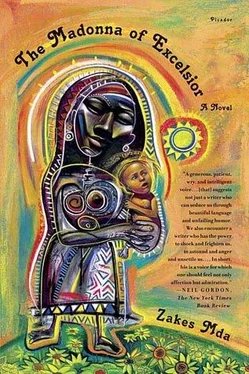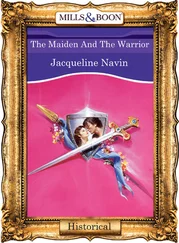Serenity rested on her shoulders like a heavy log.
THESE BROWN PEOPLE ARE less distorted than the trinity’s usual people. Perhaps it is because they carry a load of sorrow contained in a blue coffin. A small coffin that two brown men hold in their arms close to their chests. Dark brown jackets. Light brown pants. Their eyes are closed and their brown-haired heads touch as they bow above the coffin. They have to walk sideways stepping carefully on the brown ground with their bare feet. A small crowd of brown women and children follow them. Eyes closed. A barefoot girl in a brown blanket. An older girl in a blue dress. A young woman in a white dress. Two women in brown blankets. One wearing a blue doek. A grandmother in a brown blanket and blue dress. Age has cut her height to that of the barefoot girl. The brown and blue roofs of township houses stretch to the light brown sky behind the funeral crowd.
Popi’s voice rose above all voices. Its undulations carried from the cemetery to the houses of Mahlatswetsa Location a kilometre away, sending tremors of comfort even to those who had not bothered to attend the funeral. Those who had become nonchalant about funerals. They needed to be comforted, too. It was their death as much as it was that of the little boy who lay in the coffin, and of the bereaved mother who sat on a mat next to the mound that would cover her son, listening to the pastor of the Methodist Church reading the last rites.
Death lived among the people of Mahlatswetsa every day. In days gone by, a funeral was a rare occasion that everyone talked about. That everyone attended. Death was something that happened to the men who worked in the mines of Welkom, who were brought home in pine coffins after their lungs had been eaten by phthisis. Or after “the table” had collapsed on them in the dark holes where they ferreted for the gold that made white women beautiful and glittery. Death was something that happened to the aged who had lived their time on earth.
But these days death was, as the Basotho people put it in their adage, the daughter-in-law of all homesteads. Young men came home to die after being eaten by AIDS. Young women infected their unborn babies, who died soon after reaching toddlerhood. The little boy for whom Popi was singing had been more fortunate. He had reached the age of six before the disease had reduced him to a living skeleton that could not move from the bed. It was a relief for his mother when he finally gave up and breathed his last. She knew too that soon it would be her turn. Like him, she would be reduced to bones. She would be laid to rest in this very cemetery. And hopefully Popi would sing for her as well.
Popi was indeed kept busy singing at funerals. Sometimes in a single Saturday there would be three funerals, one after another. And she would sing at them all. She did not sing only at the funerals of the Methodists. She sang at Roman Catholic funerals. And mastered their hymns, which she thought lacked the liveliness and the danciness of Methodist hymns. She sang at Dutch Reformed Church funerals. And at the funerals of the Zionist Independent Christian Churches. Once she even sang at a funeral for white people. A whole family had been wiped out. Father, mother, a son and two daughters. It was one of the tragedies that had become part of the Afrikaner tradition, in which the father — faced with financial ruin and unpaid Land Bank loans — killed his whole family and then himself. Lizette de Vries, who since becoming mayor had been working closely with Popi, took her to this funeral. All eyes were on the coloured “girl” who sang Afrikaans hymns with such a heavenly voice. The Reverend François Bornman, who conducted the funeral service, stared at her and remembered Stephanus Cronje. What would he have made of this sweet-voiced creature?
Popi sang at funerals only on Saturdays. Or on Sundays, when they spilled over to the next day. During the week she immersed herself in the work of the council. Especially the library. When there were no council meetings, she spent all her days in the library, paging through books and caressing them. She took it as a blessing that she was no longer a member of the Movement since Sekatle had finally succeeded in getting her and Viliki expelled for bringing the Movement into disrepute. The Movement’s patience with the Pule Comrades had finally run out when they had voted Lizette de Vries into the mayorship. After an investigation had been conducted by the big guns of the provincial executive council, Popi and Viliki were both kicked out of the Movement, without any hearing where they could defend themselves. The Pule Comrades became plain Pule Siblings, for comradeship was reserved only for those who belonged to the Movement.
The Pule Siblings would, however, remain town councillors until the next local elections. Not that Sekatle had not tried to get them kicked off the council as well. Unfortunately, the constitution of the land did not allow him to do so. Only the people who had elected them to the council could remove them through the ballot box. Popi thought it was pathetic the way Viliki insisted that he was still a member of the Movement, whether Sekatle and his allies liked it or not. He had worked for this Movement to make it what it was in the rural areas of the Free State. He was going to die a member of the Movement.
“Why would you want to remain a member of an organisation that does not want you?” she asked.
Popi felt free now that she did not have to attend branch meetings and caucuses. On the council, she and her brother were able to vote with their consciences rather than having to toe some political line. Without the demands of the Movement, she could even indulge in the occasional cow-dung gathering expedition with Niki.
While Popi was immersed in books, cow-dung and funerals, Viliki was immersed in the Seller of Songs. His body sang deep inside hers. And hers to his. Until they broke into sharp arias that sounded close to pain. Although the sharpness disturbed the neighbours and passers-by, it was celebratory in its exhilaration.
Everybody in Excelsior was immersed in something. Even Tjaart Cronje. He was immersed in anger. This was an immersion he shared with Popi. She, of course, denied that there was any anger in her. Tjaart Cronje was more honest. He did not make a secret of his anger. His people had been sold out by their leaders, he lamented. The ageing matriarch, Cornelia Cronje, joined him in his laments. She was immersed in an anger of her own. And in loneliness. The affirmative action people, as mother and son called them, were entrenching themselves in power and becoming more confident. Some would say more arrogant. Even though the mayor was a true-blooded Afrikaner woman, she was a quisling who trod lightly and didn’t want to offend “these people”. She was obviously being misled by Popi Pule, with whom she was seen on many occasions. This Popi must be the one who was advising her to defer to the interests of the people of Mahlatswetsa Location. Only when he got home in the evenings did Tjaart Cronje receive relief from this burning anger. In his castle, the Afrikaner was still the boss. And Jacomina was the soothing balm.
It was true that Her Worship the Mayor of Excelsior seemed to rely very much on Popi’s counsel. It was Popi who had suggested that it would do Excelsior a lot of good if the town had a festival of its own. Small towns were thriving on festivals that promoted a local product. Even the dusty towns of the faraway Eastern Cape. Barkly East, for instance, had a Trout Festival. Some of these festivals gained fame nationally, and even internationally, like Fick-burg’s cherry festival. Although the organisers of this festival liked to claim that it belonged to the rest of the eastern Free State, it really benefited Ficksburg more than any other town. It put Ficksburg on the map. Not Fouriesburg. Not Clocolan. Not Ladybrand. And certainly not Excelsior.
Читать дальше












